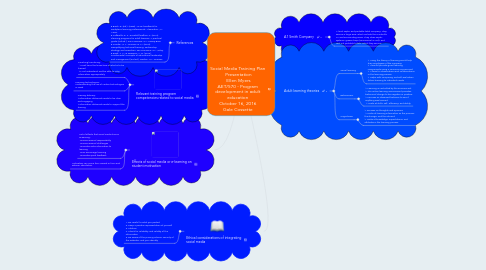Social Media Training Plan Presentation Ellen Myers AET/570 - Program development in adult education October 16, 2016 Gale Cossette
by ellen myers


1. Effects of social media or e-learning on student motivation
1.1. List of effects that social media has on eLearning: *Gives Personal responsibility *Gives Personal challenges *Provides extra information to learning *Can encourage learning *Provides quick feedback
1.2. Motivation can come from inward or from and exterior stimulation.
2. Ethical considerations of integrating social media
2.1. 1. Be careful to what you posted 2. Keep a positive representation of yourself 3. Citation 4. Check for reliability and validity of the information 5. Be aware of the privacy policies, security of the websites, and your identity
3. Relevant training program competencies related to social media
3.1. Coaching/Mentoring: >Must have the know-how of what is to be trained >Must understand and be able to relay information appropriately
3.2. Learning technologies: Understanding the use of certain technologies in need
3.3. Training delivery: >Information delivered needs to be clear and engaging >Information delivered needs to support the training
4. References
4.1. • Biech, E. (Ed.). (2008). ASTD handbook for workplace learning professionals. Alexandria, VA: ASTD. • Caffarella, R. S., & Ratcliff Daffron, S. (2013). Planning programs for adult learners: A practical guide (3rd ed.). San Francisco, CA: Jossey-Bass. • Combs, W. L., & Davis, B. M. (2010). Demystifying technical training: Partnership, strategy, and execution. San Francisco, CA: Wiley. • Razik, T. A., & Swanson, A. D. (2010). Fundamental concepts of educational leadership and management (3rd ed.). Boston, MA: Pearson.
5. A1 Smith Company
5.1. A local septic and portable toilet company. They service a large area, which include the Huntsville TX and surrounding areas. They clean septic systems, grease traps (commercial or not), and rent out portable toilets, which they service.
6. Adult learning theories
6.1. Social learning
6.1.1. > Using this theory of learning would help train employees of the company. > It would provide good learning components using a common environment > Allows for observations and collaborations in the learning process > Helps with comparing and self-evaluation tailors learning to individual needs
6.2. Behaviorism
6.2.1. > Learning is controlled by the environment > The online learning environment provides behavioral change to be negative or positive > Focuses on observed behavior to see if anything was learned > Looks at skills, self- efficiency, and ability
6.3. Cognitivism
6.3.1. > Focuses on thoughts and opinions > Looks at learning information as the process, the storage, and the retrieval > Looks at knowledge, expectations, and attitudes in the learning process
